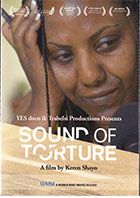
Sound of Torture 2013
Distributed by Women Make Movies, 115 W. 29th Street, Suite 1200,New York, NY, 10001; 212-925-0606
Produced by Osnat Trabelsi and Galit Cahlon
Directed by Keren Shayo
DVD,
General Adult
Eritrea, History, Human Rights
Date Entered: 05/23/2016
Reviewed by Sandra Collins, Byzantine Catholic Seminary Library, Pittsburgh, PAMeron Estefanos, an Eritrean journalist living in Sweden, uses her online radio program to lobby on behalf of Eritreans, desperate to escape the brutal regime in their homeland. Since Europe closed their borders to African immigrants in 2006, escape through the Sinai desert to the freedom of Israel and beyond seems the only option. However, for those precious few who make it through to Israel, they become refugees in a land where they have no social safety net and are seen as outcasts and pariahs upon society. Opportunistic Bedouin kidnappers prey upon the bulk of these refugees, using torture and brutality to force families to pay for their release. Viewers hear the desperate phone calls from hostages to Estefanos’ radio program. The hostages are given cell phones in order to plead with their families to raise exorbitant sums of money ($25,000-$40,000) while the sounds of beatings and rapes fill the background. Yet, sadly, those who do secure their release are often recaptured by the Egyptian border police, who then commit these refugees to yet another brutal incarceration in a system that views them as expendable. No images of the actual torture are shown. Yet, far more disturbing is the gaze of Ms. Estefanos, who cannot look, who begs her contact in Israel not to show her more images of brutality. Yet, she must if she is to do the work of identifying and notifying those who have entrusted her with information regarding their loved ones trapped in Egyptian prisons or Bedouin torture camps. Similarly, we need only imagine what life is like for those who were there as the damaged bodies and traumatized psyches of those who survived the torture camps are shared with Ms. Estefanos. Her passion for her work is often tempered by the overwhelming task of trying to get someone—anyone—to care about these refugees.
What comes through with stunning clarity is the unbelievable inhumanity rampant in this situation—not simply the kidnappers but local community disinterest, the callousness of local law enforcement and most stunningly, the institutional deafness by the UNHCR as well as the Israeli, Egyptian and US governments. No one can doubt the sincerity of Ms. Estefanos—nor the director, Keren Sharyo’s—commitment to bringing the suffering of this situation to a larger audience by seeking to touch the humanity within us all.
Awards
- Best Short Documentary, Israeli Film Academy Award
- Best Debut Film, Docaviv
- Audience Award, Movies that Matter